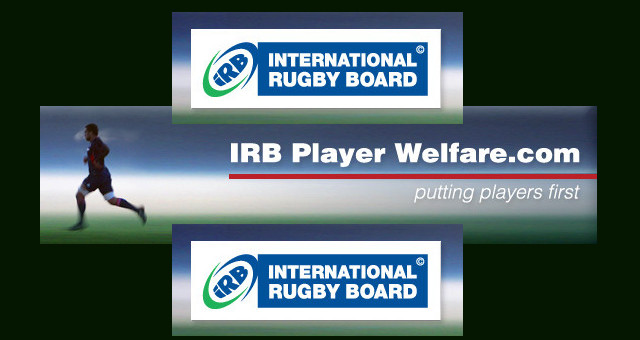|
- Research reaffirms PSCA is protecting elite players
- Enhanced balance and memory tests approved
- Pitch-side head injury assessment time increased to 10 minutes
- IRB committed to driving cultural change
The IRB has reaffirmed its commitment to player welfare with the announcement of enhancements to the pitch-side head injury assessment process for elite Rugby.
The latest IRB-commissioned research into the pitch-side assessment of head injuries in elite Rugby conducted in 2012-13 has seen a drop in the number of concussed players returning to the field of play.
Accepted for publication in the British Journal of Sports Medicine, the study highlights that prior to the global trial of the Pitch-side Suspected Concussion Assessment (PSCA) tool 56 per cent of players assessed and left on the field of play were later determined to have sustained a concussion.
Since the PSCA trial began in 2012 the percentage has reduced to 13 per cent with this reduction attributed to the combined strategy of education and implementation of the research-driven assessment. Despite these positive results the IRB is committed to driving cultural change within the sport and further reducing the percentage.
Data from the trial has also enabled the IRB’s independent concussion working group to identify enhancements to the PSCA tool, which is used to assess a player when the diagnosis of a head injury is unclear. If symptoms are evident the message remains recognise and permanently remove the player – the PSCA tool should not be used.
Two components of the PSCA tool have been expanded, with the memory test strengthened and the balance test altered, enhancing the information team and independent doctors have available to them when making a return to play decision.
In order to accommodate the expanded PSCA components and following a successful pilot trial, the IRB Executive Committee has approved an increase in the time permitted to undertake the assessment from five to 10 minutes. The new trial will operate from June 1.
IRB Chief Executive Brett Gosper said: “Concussion management and education sits at the very top of the IRB’s player welfare strategies aimed at informing, supporting and protecting players at all levels of the Game.”
“The IRB centres its player welfare policies on evidence-based research and we are delighted that the data from this trial indicates we are making strong progress while informing the areas where we can continue to learn, improve and ultimately drive forward player welfare best-practice.”
“Concussion is a serious public health issue that affects many sports. The PSCA has proven a successful part of our long-term commitment to educating and protecting players at all levels and driving cultural change.”
“As a process for the elite Game, the pitch-side assessment covers less than 0.5 per cent of the 6.6 million men, women and children playing Rugby worldwide and our key message to the community Game remains recognise and remove.”
VISIT THE WWW.IRBPLAYERWELFARE.COM WEBSITE HERE>>
CLICK HERE TO VIEW THE PUBLIC EDUCATION RESOURCE>>
The enhanced protocol comes with the full support of Unions and the world’s top players.
England international and RBS 6 Nations Player of the Championship Mike Brown said: “I applaud the significant steps that Rugby is taking in the area of head injury management. It is reassuring that the IRB is using research to drive forward policies and resources that protect and educate players at every level.”
International Rugby Players’ Association Executive Director Rob Nichol added: “It is great to see Rugby leading the way in the critical area of concussion management, an aspect of the Game we must continually look to improve. The ability to remove a player from the field of play to allow a decent clinical assessment, and the introduction of the PSCA test to support that process has proven a positive development for the welfare of our elite players.”
“The requirement that if at any time a player in the elite Game displays the symptoms associated with suspected concussion, or fails the PSCA test, he must be permanently removed is clear. These refinements will further enhance the standard of care for elite players and coupled with strong education, continue to drive cultural change throughout the Game.”
Meanwhile, the IRB and Fédération Française de Rugby (FFR) immediately requested a report into apparent failure to apply the IRB head-injury protocols that led to Toulouse player Florian Fritz returning to the field of play during the Top 14 match against Racing Métro on May 9.
Editors Notes
PSCA: The Facts
- Any player showing clear symptoms of concussion should be permanently removed from the field of play, undertake a SCAT 3 and not progress to a graduated return to play until symptom free for at least 24 hours
- The PSCA is not a diagnosis tool, it is an assessment tool that is used when no clear symptoms of concussion are visible, giving the team or independent medic further information to make an informed decision
- All players who have undertaken a PSCA, regardless of pass or fail, must complete a SCAT 3 assessment after the match/training
- Prior to the PSCA and graduated return to play, concussion reporting was largely forced undergroundConcussion research
- RFU study reported between 2002 and 2006 58 per cent of confirmed concussion cases were not removed from the field of play despite medical practitioner education
- The 2012-13 trial included 165 PSCA interventions with an 88.1 per cent negative predictive value (11.9 per cent of players returned to the field of play were determined to have sustained a concussion following post-match mandatory examination)** extract from forthcoming study accepted and approved for publication in the British Journal of Sports MedicinePrior to the PSCA trial
- IRB Junior World Championship 2018-2012 research: 50 per cent of players assessed on the field of play were later determined to have sustained a concussion
- IRB Junior World Trophy 2008-2012 research: 60 per cent of players assessed on the field of play were later determined to have sustained a concussion
- RFU 2001-2010 research: 56 per cent of players assessed on the field of play were later determined to have sustained a concussion
* all above studies have been publishedIRB Concussion Education Programme: Recognise and Remove - Concussion education module for Union match day medical staff
- Concussion education delivered to 119 Unions at IRB General Assembly
- Mandatory concussion education for IRB Match Officials
- Mandatory concussion education components within the IRB Rugby Ready programme (118,000 completions)
- Mandatory education at IRB Junior World Championship and IRB Junior World Rugby Trophy
- More than 4,800 completions of the concussion specific modules available at www.irbplayerwelfare.com/concussion
- 427 completions of the IRB Match Day Medical Staff course with specific Pitch-side Suspected Concussion Assessment (PSCA) module
- Ongoing work to support four key groups of stakeholders:
i) General Public
ii) General Practitioners
iii) Health Care Professionals working with Rugby teams
iv) Union Chief Medical Officers




